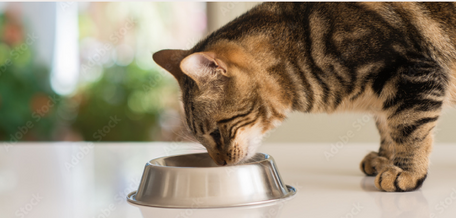"Unlocking Allergy Relief: How Raw Feeding Transforms Your Cat's Well-Being"
If you're a cat owner like me, dealing with a cat who suffers from allergies is hard. The constant itching, skin irritations, digestive issues, and even the dreaded ear infection! The bad news is that the food you are most likely feeding your cat, traditional kibble or canned foods, is most likely the culprit. The allergy issues your cat is dealing with is most likely due to fillers, grains, and preservatives that are prevalent in traditional cat foods.
That's where BJ's Raw Pet Food, and raw feeding for cats comes to the rescue! A raw diet for cats is a biologically appropriate approach that mimics what felines (or cats) would eat in the wild. In this blog, we will chat about how a raw diet can benefit cats with allergies. And don't just let us tell you, we will provide insight from veterinarians and pet nutrition experts.

Understanding Cat Allergies: Common Triggers and Symptoms
Cats can develop allergies to food, environmental factors (like pollen or dust mites), or even fleas. Food allergies are particularly common, often triggered by proteins in beef, chicken, dairy, or grains like corn and wheat found in commercial pet foods. Symptoms include:
- Excessive scratching or licking, leading to hair loss or hot spots.
- Gastrointestinal upset, such as vomiting, diarrhea, or flatulence.
- Chronic ear infections or respiratory issues.
- Dull coat, flaky skin, or recurrent skin infections.
If your cat shows these signs, a vet diagnosis is crucial—sometimes via an elimination diet. But many owners turn to raw feeding as a proactive step, as it avoids processed ingredients that may fuel allergic reactions.
What Is a Raw Diet for Cats?
A raw diet, often called BARF (Biologically Appropriate Raw Food), consists of uncooked muscle meat, organs, bones, and sometimes small amounts of fruits or vegetables. It's designed to replicate a cat's ancestral diet as obligate carnivores—think whole prey like mice or birds. Key components include:
- Muscle Meat: Chicken, turkey, rabbit, or beef for protein.
- Organs: Liver, heart, and kidneys for essential vitamins and minerals.
- Bones: Ground or whole for calcium and dental health.
- Supplements (if needed): Taurine, omega-3s, or probiotics for balance.
Commercial raw cat foods from brands like Stella & Chewy's or homemade versions (formulated with vet guidance) are popular options. Unlike kibble, raw food skips high-heat processing, preserving natural enzymes and nutrients.
Key Benefits of a Raw Diet for Cats with Allergies
Switching to raw can be transformative for allergic cats. Here's how it helps, based on expert observations and owner experiences:
1. Elimination of Common Allergens
Processed cat foods often contain grains (corn, wheat, soy), artificial additives, preservatives, and by-products—these are frequent culprits in food allergies. A raw diet focuses on single or novel proteins (like rabbit or venison), making it easier to identify and avoid triggers. For instance, if your cat is sensitive to chicken, you can opt for beef or fish-based raw meals. This "clean" approach has helped many cats reduce symptoms without needing steroids or antibiotics.
2. Improved Gut Health and Immunity
Up to 70-80% of a cat's immune system resides in the gut. Raw diets promote better digestion by providing high-moisture, enzyme-rich food that's easier to break down than carb-heavy kibble. This can alleviate IBS-like symptoms and reduce inflammation linked to allergies. Added probiotics in some raw formulas further support a balanced microbiome, helping the body "rebalance" and lessen overreactions to allergens.
3. Healthier Skin and Coat
Allergies often manifest as itchy, flaky skin or a dull coat. Raw food's high-quality proteins, omega fatty acids, and natural oils from sources like fish or organs nourish the skin from within. Owners report shinier fur, reduced shedding, and fewer hot spots after transitioning. In one veterinarian's experience, raw diets resolved chronic skin issues in cats resistant to other treatments.
4. Better Weight Management and Energy Levels
Overweight cats are more prone to allergies due to inflammation. Raw diets are low in carbs and high in protein, promoting lean muscle and sustained energy without blood sugar spikes. This can indirectly ease allergy symptoms by reducing overall stress on the body.
5. Potential for Long-Term Allergy Relief
While not a cure-all, raw feeding may desensitize cats to environmental allergens by strengthening overall health. Some studies and anecdotal evidence suggest it can even reduce human allergies to cats by altering the proteins in their saliva, though this is more of a bonus for owners.
| Benefit | How Raw Diet Helps | Potential Outcomes for Allergic Cats |
|---|---|---|
| Allergen Elimination | Avoids grains, fillers, and processed proteins | Fewer food-triggered reactions, clearer skin |
| Gut Health | High moisture, natural enzymes, probiotics | Reduced diarrhea, stronger immunity |
| Skin & Coat | Omega-3s and quality fats | Less itching, shinier fur |
| Weight Control | Low-carb, high-protein | Lower inflammation, easier allergy management |
| Overall Wellness | Balanced nutrients from whole foods | Long-term symptom relief, more energy |
How to Transition Your Cat to a Raw Diet Safely
Start slow to avoid digestive upset—mix raw with current food over 7-10 days, increasing the raw portion gradually.
- Consult Your Vet: Get bloodwork and allergy testing first. A board-certified veterinary nutritionist can help formulate a balanced homemade diet.
- Choose Quality Sources like BJ's Raw Pet Food and other great companies out there. We have some great high-quality options for your cat!
- Portion Control: Feed 2-4% of body weight daily, split into meals.
- Monitor Progress: Track symptoms in a journal; adjust proteins if needed.

Conclusion: Is a Raw Diet Right for Your Allergic Cat?
A raw diet offers a natural, allergen-free path to better health for cats with allergies, potentially reducing symptoms through superior nutrition and gut support. If your cat struggles with chronic issues, it could be the game-changer you've been seeking. Always prioritize vet guidance to tailor it safely.
Ready to try? Check out our Feline Intro Pack to make the transition easier!
Disclaimer: This post is for informational purposes; consult a veterinarian before dietary changes.




















